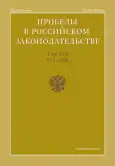Doctrinal Approaches to the Concept and Content of State-Religious Relations in the Russian and Foreign Legal Literature
- Authors: Zudov Y.V.1
-
Affiliations:
- Kutafin Moscow State Law University (MSAL)
- Issue: Vol 17, No 3 (2024)
- Pages: 217-222
- Section: Miscellaneous
- URL: https://journal-vniispk.ru/2072-3164/article/view/260108
- EDN: https://elibrary.ru/JOKSGD
- ID: 260108
Cite item
Abstract
The purpose of the research. The article examines doctrinal approaches to the concept and content of state-religious relations in Russian and foreign legal literature. Results. The author identifies three main models of conceptualization of state-religious relations: secularist, theocratic and consensual. The secularist model is based on the principle of institutional and functional separation of the spheres of state and religion. Its supporters insist on the non-interference of the state in the affairs of the church and the non-interference of the church in the affairs of the state. At the same time, the state guarantees the freedom of conscience and religion of citizens, while support for one or another denomination is not provided. The theocratic model assumes that the state should be based on religious principles and values, and religion, in turn, should actively participate in the formation of state policy. Religious and secular legislation are closely intertwined within the framework of this model. The consensual model proceeds from the possibility of coexistence of the state and several faiths on a parity basis, their mutual cooperation with the preservation of autonomy. At the same time, the state guarantees equal rights to all religions, without giving preference to any one of them. The author notes that in modern science there is no single, generally accepted definition of state-religious relations. It has to do with versatility and complexity of the interrelationships between state institutions and religious associations, as well as the difference in ideological and methodological approaches of researchers.
Keywords
Full Text
##article.viewOnOriginalSite##About the authors
Yury V. Zudov
Kutafin Moscow State Law University (MSAL)
Author for correspondence.
Email: yury.zudov@mail.ru
SPIN-code: 8255-8906
Scopus Author ID: 1022904
Cand.Sci.(History), Associate Professor, Department of State and Law History
Russian Federation, MoscowReferences
- Kamalova A. A. Basic principles and directions of state-religious relations in a secular state: world and Russian experience: specialty 23.00.02 "Political institutions, processes and technologies": dis. for the Candidate of Science degree. watered Sciences, 2019.
- Bagaeva K. A. State-religious interaction in modern Russian society // Bulletin of the Buryat State University. Philosophy. 2016. No. 3. P. 83-86.
- Grafsky V. G. On an interdisciplinary approach to the study of law and laws // Contours of global transformations: politics, economics, law. 2012. No. 4 (24). pp. 106-108.
- Afonasina A. S. Ideal religion for an ideal state // Ideas and ideals. 2020. No. 4-2. pp. 330-350.
- Meslier J. Testament / John Meslier (according to Voltaire). M.: Atheist, 1924.
- Montesquieu S. On the spirit of laws. M.: Ripol-Classic, 2018.
- Volodina N.V. Legal systems of state-confessional relations. M.: New index, 2009.
- Mchedlova M.P. Religions in modern society // Sociological studies. 2009. No. 12. P. 77–84.
- Durham. W. K. Prospects for religious freedom: a comparative analysis. M.: Institute of Religion and Law, 1999.
- Alessandro Ferrari. National Identity and Religious Freedom: the Italian Case // Human rights in Russia and abroad. M., 2007. P.185-191.
- Zyubanov Yu. A. Christian foundations of the criminal code of the Russian Federation: a comparative analysis of the norms of the Criminal Code of the Russian Federation and the Holy Scriptures. M.: Justina; Prospect, 2007.
- Ovsienko F.G. Politicization of confessions and clericalization of politics: development trends and risks in Russian society // Religious Studies. 2002. No. 2. P. 20-29.
- Abrahamian E. Khomeinism: Essays on the Islamic Republic. London: I. B. Tauris and Berkeley: University of California Press, 1993.
- Mamedova N. M. Political system of the Islamic Republic of Iran: features and possibilities of transformation // Contours of global transformations: politics, economics, law. 2018. No. 3. pp. 152-165.
- Shayo A. To the concept of constitutional secularism // SKO. 2009. No. 2 (69). pp. 22-31.
- Hick J. A Pluralist View // Four Views on Salvation in a Pluralistic World / D.L. Okholm, T.R. Phillips (eds.). Grand Rapids, Michigan: Zondervan Publishing House, 1996, pp. 29-59.
- Petyukova O. N. Legal forms of relations between the Soviet state and the Russian Orthodox Church in 1917-1945: dis. ... Doctor of Law. Sciences: 12.00.01/ O.N. Petyukova. M., 2011.
Supplementary files








